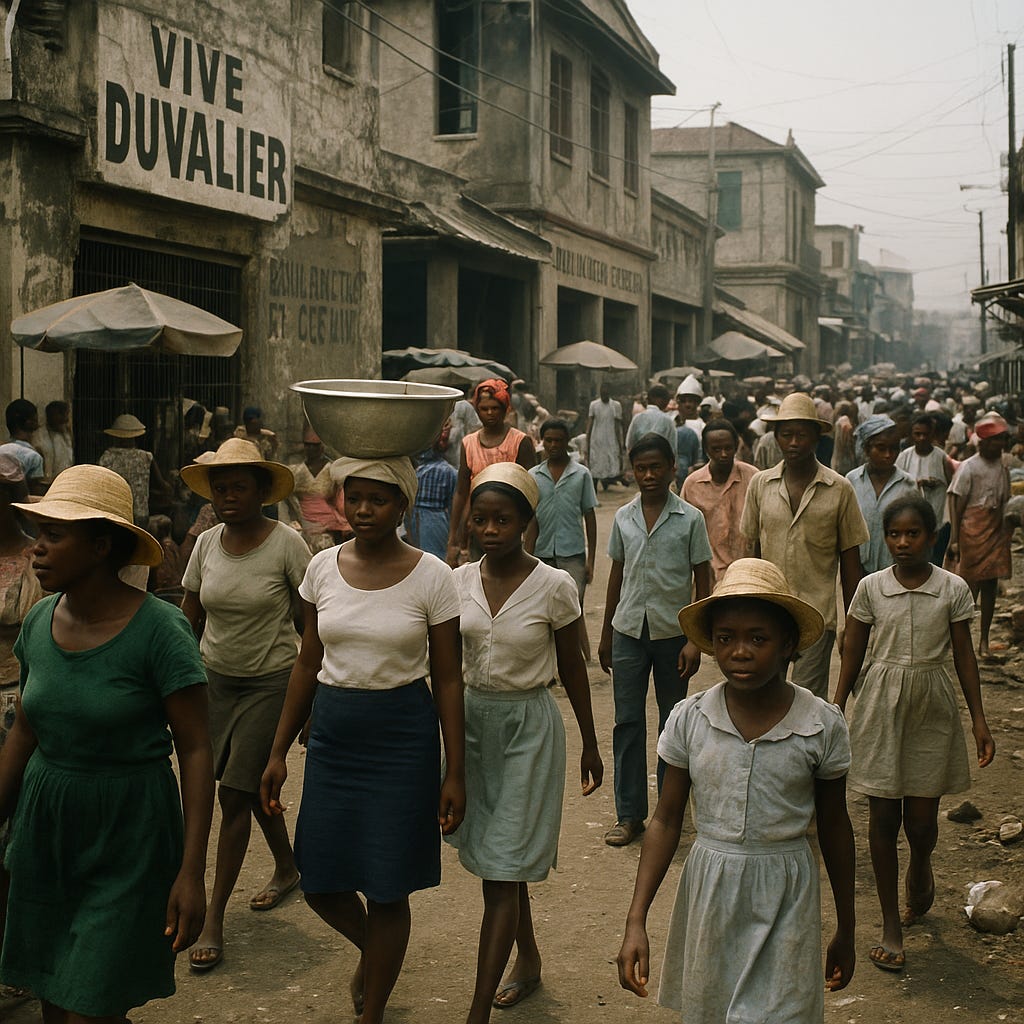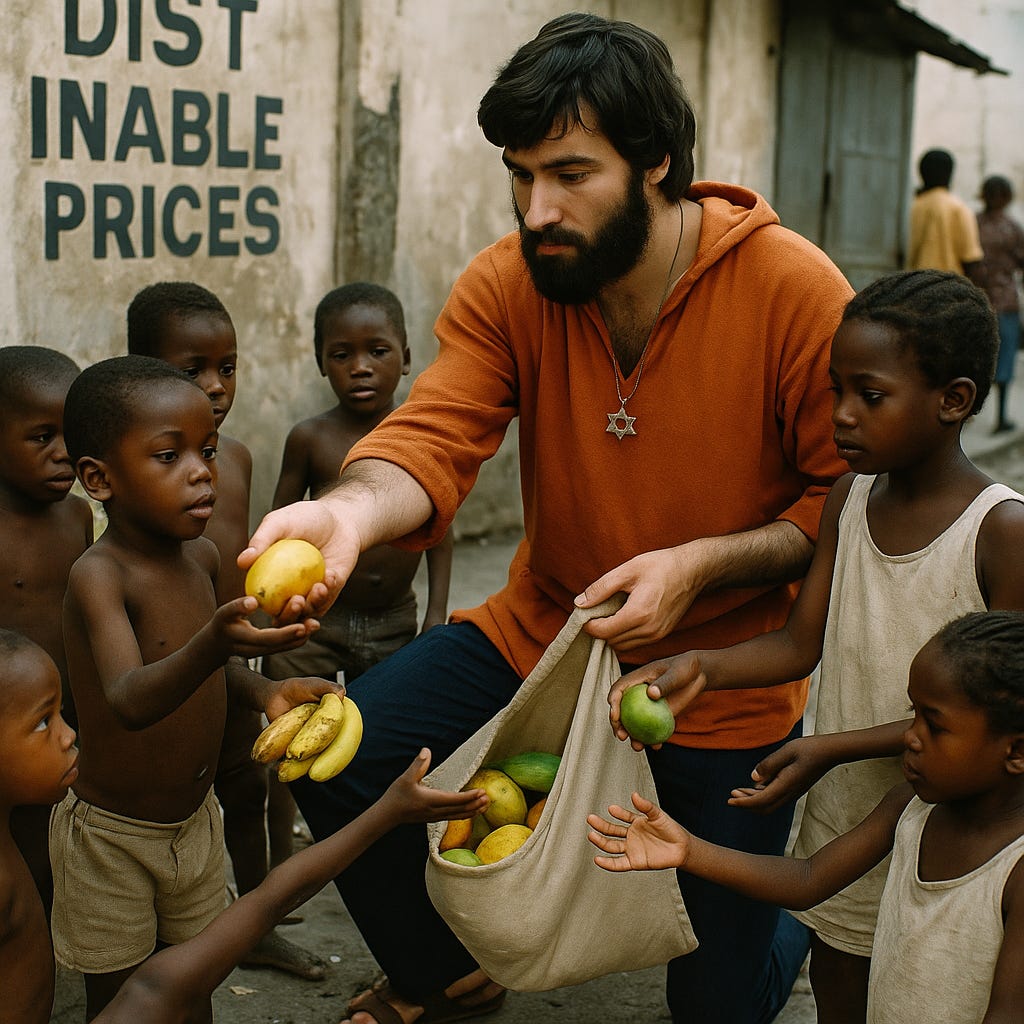Haiti. Port-au-Prince. Late ’70s, early ’80s. Club Med, of all places.
I already knew something was wrong.
Jean-Claude Duvalier—Baby Doc—was still in power. Took the reins from his father at nineteen. It wasn’t a government. It was a smile stitched over a dictatorship. Executions. Disappearances. Hunger that pressed like gravity. The Tonton Macoutes still patrolling. Everyone knew. No one saw.
I was in my late twenties. Beard thick. Ponytail down my back. Dressed in the kind of orange you associate with monks or madness. Hooded cotton pullover. Deep pouch across the front. No camera. No sunglasses. Just a Star of David on a string—unpolished, heavy against my chest. I didn’t move like a tourist. I moved like I’d already read the last page.
The Club Med bus was a battered yellow school bus. Windows wide open. Diesel and dust coating your teeth by the time you spoke. Port-au-Prince blurred past in streaks of rust, concrete, and sun. That’s when the sickness started.
Not metaphor.
Real death.
Bodies curled in doorways like punctuation marks. Legs folded beneath them. Dull eyes. Ribs like birdcages. Flies thick like fog. Some of the kids didn’t move. I couldn’t tell who was sleeping. Who wasn’t coming back.
The stench—urine, feces, rot—wasn’t poverty. It was abandonment. This is what happens when history rots in the sun.
No one else flinched.
Spanish couple up front argued about dinner reservations.
German guy behind them pointed at the ocean. “Sehr schön.”
French couple said it was “exotic.”
British man laughed: “Bit rougher than Ibiza, eh?”
Vacation chatter.
Collapse outside.
My skin crawled.
I could’ve joined in. I’d been raised well. Jewish. Montreal. Words like charity, empathy and action stitched into my blood. But I couldn’t pretend. That was the line—between comfort and complicity.
Club Med looked like someone had drawn a smile across a corpse. Manicured palms. Buffet tables. Uniformed greeters. Calypso music, tinny like a ringtone for anesthesia. I stepped off the bus and threw up in the hibiscus. No one asked why. They handed me a cold towel. Offered me rum punch. I didn’t drink it.
I had four hours to walk, to breathe, to sit cross-legged near the garden wall and write. I read a little. Watched. Observed. And tried not to look away. But it was impossible not to see it—the line. The line between the haves and the ones who were barely still here. Staff in clean whites clearing empty glasses. Beyond the gates: cracked streets, cracked ribs, cracked futures.
When I changed for dinner, I took off the orange. Put on a dark red Tibetan shirt. Wide sleeves. Brass clasps. A pair of cotton slacks. I looked like a wandering mystical rabbi who forgot what he came to teach.
Long table. White tablecloth. Soft clinking. Spanish. French. Italians. Germans. English. Pressed shirts. Necklaces. Perfume. Wine.
The German called the locals Schwarzes.
The Italian woman: Negri, no?
The Frenchman: Les Noirs, c’est normal.
The Brit chuckled: “We just said negroes, back in my day.”
Laughter.
Then a man with a drawl—Arkansas maybe, or Georgia—leaned in and said,
“Well now, this is just the way the world works. Always has been. Some got. Some don’t. That’s just how it goes.”
He sipped his wine like he was toasting the plantation.
Then: “And you, monsieur? What did you think of your day?”
I didn’t flinch.
“I found it very difficult.”
“I was raised in a good home. Jewish. Parents who believed in justice. I’ve seen most of the world. But this? Watching children starve—not as metaphor, not in a textbook, but right there, right outside the window—it hurt. It still hurts. I don’t want to be part of a machine that treats that as background. So I’m leaving.”
The French woman touched her chest. “Mon Dieu… tu es un amour.”
The Italian nodded. “Tu sei un’anima gentile.”
Nervous laughter.
The Brit lifted his glass. “Good sense of morals. Said it well. Respect.”
The next morning, I woke early. 6:30. My body dense. Syrupy. Not just the blood—something deeper. I needed insulin, yes. But something else needed doing first.
I walked into the Club Med kitchen. Staff were prepping quietly. I grabbed a cotton shoulder bag and filled it with fruit. Mangoes. Guavas. Bananas. Oranges. One staff member saw me. Met my eyes. Nodded. Nothing else.
At the front desk, they made me sign a waiver. “If you’re killed,” it implied, “don’t blame us.” I signed. Walked out. Past guards. Past machine guns. Into the other world.
The air shifted. Thicker. The sun slapped harder. Language louder. Creole barked like a warning. It wasn’t the words that rattled me—but the men. Hard eyes. Suspicious without needing a reason.
But the women…
The women were breathtaking. Even tired. Even barefoot. They carried themselves like memory. Tall. Silent. As if they remembered being queens. Eyes deep with beauty, and something older than beauty—resilience.
The children came in waves. Four years old, ten, barefoot, half-naked. Skin smeared with dried piss and dust. The smell—human, ancient, unbearable. They didn’t speak. Didn’t ask. Just reached.
I gave. A mango. A banana. A guava. Some took and ran. Some waited, frozen, until I nodded. I nodded. They smiled.
Not smiles like joy.
Smiles like survival.
Smiles that rewrote the rules of scripture.
One boy clutched his mango like treasure. Kept glancing behind. A soldier watched. His hands trembled. I wanted to whisper: Eat it now. But I didn’t have the words. So I knelt beside him. He looked at me. I smiled. He bit in. Slowly. Like prayer.
Another boy had his fruit snatched. I stepped in. Gave another. Tried to balance the moment. Hunger makes thieves of angels.
One girl didn’t leave. Just stayed by me. Didn’t ask. Didn’t smile. Just stood. When the bag was empty, I stood still.
The crowd lingered. More children. More hands. I closed my eyes. Let them pull, tug, press against me. Let them make me disappear.
Eventually, they faded.
I opened my eyes. The street was still. The stench clung like a second skin.
I walked back. Slowly.
Club Med hadn’t changed. Champagne. Tennis. A bus waiting—just for me.
The driver greeted me in French that wasn’t French. Not Paris. Not Quebec. Creole.
I caught one word: Juif.
Another: Canada.
Then: mort.
He kept talking. I didn’t understand the words. But I felt them. Like they were meant for me.
Outside the window:
A woman barefoot, baby strapped to her back, breasts dry, eyes drier.
Children curled on sidewalks like commas.
Bodies still there.
And I thought: I’m going home.
But no one will believe me.
They’ll say,
“Come on, it’s Club Med.”
“How bad could it be?”
“Didn’t you have fun?”
“It was free, right?”
They won’t understand.
That it was this bad.
That part of me stayed there. In the dust. In the air. In the memory.
In the mango juice sliding down a child’s chin while a soldier watched.
I didn’t go for a story.
But the story came home with me.
And now, forty years later—when my own blood runs thinner, and the world keeps asking what we did with our seeing—
I’m finally letting it speak.
fin
Please consider a paid subscription






Wow, that hits hard thanks! Tourism in countries with so much economic disparity always seems so troubling to me. There’s a blindness of convenience so holidays can be enjoyed without guilt. You leaned into that pain of scarcity and let it guide compassionate action. And then you shared it with others through your writing. Thanks again.
"I'm going home." Where in the world is home after seeing this? Nothing ever dies. Everything stays within, until you become a mosaic of all the people you've met along the way. You're just the string that holds the memories together. And some things...are unforgettable, for even if the mind forgets, the body never will.